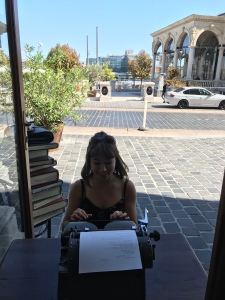As always, if you want a completely untainted first reading of the novel, don’t read this piece (but make a note to check it out after taking The Professor, and Villette, out from the library). I’ve tried to avoid explicit spoilers but am aware that scattered details do impact the reading experience.
Charlotte Brontë certainly doesn’t care much for good-looking characters.
But that isn’t to say that her heroines and heroes aren’t beautiful. As with plain Jane Eyre, or pitiful Lucy Snowe, or stern-featured Mr Rochester, neither William Crimsworth (the eponymous professor), his heroine, nor even the woman whom he comes to hate after first admiring, are physically captivating. Crimsworth doesn’t even have Mr Rochester’s athletic figure to redeem him.
And yet, just as Jane is universally admired as a fiery, independent and brilliant young woman, just as Rochester’s manliness supersedes his imperfect features and makes him an undeniably attractive Byronic hero, just as the only man worth having in Villette choses Lucy Snowe in spite of her lack of ‘attractive accomplishments’, so too do we esteem Crimsworth, and even more so his charming bride, despite their outward plainness.
The true beauty of almost every one of Brontë’s worthy characters lies in their personality, their morals, their affections, their endeavours, their behaviour to others, their resolution, their spirit – but most importantly their own ability to see beyond superficial attractiveness and discern the hidden (or, rather, unboasted) charms of their equally admirable counterparts. Though we gradually come to know and love their virtues throughout the early course of the novels, it is when another character, with whom we are beginning this same process, starts to make the discoveries which we have, that Brontë really rewards us.
One wonders whether Brontë chooses to create such explicitly plain, if not outright ugly, characters simply to make our eventual adoration of them all the more gratifying. Probably, as a conscious, and remarkable, writer, this was her intention and primary motive. But, when we consider that it is in the Belgium novels – Villette, with despairing and woeful Lucy Snowe, and The Professor, where both hero and heroine seem so severely insignificant and down-trodden (when it comes to worldly position as well as ostensible charms) – that this contrast is so sharply drawn. Here we see the most dire situations, the most pitiable circumstances; but positions and persons so outwardly undesirable conceal the most potently beautiful inner virtues. Good looks become the quivering flame of a dying match, insignificant in and defeated by the torrential downpour that is beauty and honesty of character.
Deep down, there is worth, animation, integrity, brilliance – and, most importantly, the means of happiness – in the hearts of the unfortunates which Brontë chooses to make the focus of her study. But it was in Belgium, in the schoolroom setting which Brontë gives us in these two novels, that her own intense, but eventually painful, fruitless, and unrequited infatuation with her married professor (upon whom both William Crimsworth and Monsieur Paul Emmanuel are strongly based) began.
Are the merits of these characters, these pictures of goodness, resolution, virtue, and love hidden beneath harsh, shy and unattractive exteriors, symbolic of the hope which Brontë at first secretly cherished, and later bitterly cast off, or buried still more deeply?
Whatever her motives, the sense of place, character and feeling which Brontë achieves in this early work (composed before Jane Eyre, but initially rejected for publication and released posthumously), and even more successfully in its more sophisticated, later rendition Villette (her last novel, into which a lot of The Professor was re-written) is stunning. Her creative imagery and description, dazzling and extended personification of abstracts, and her simple story are impressively satisfying but, when we consider the state of heart in which it was written and its material re-worked in Villette, incredibly touching.
